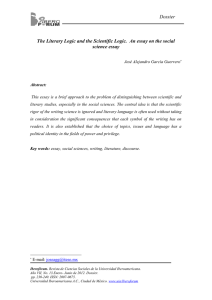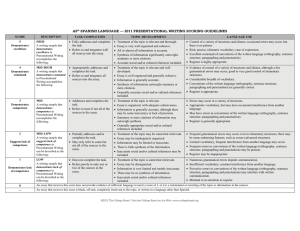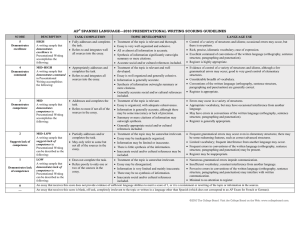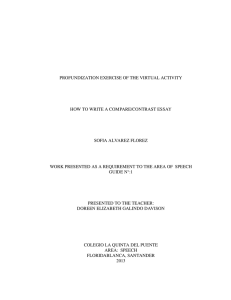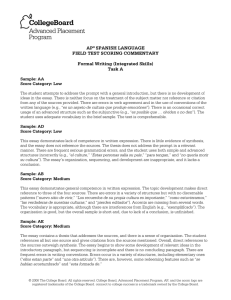Sample Responses Q1 - AP Central
Anuncio
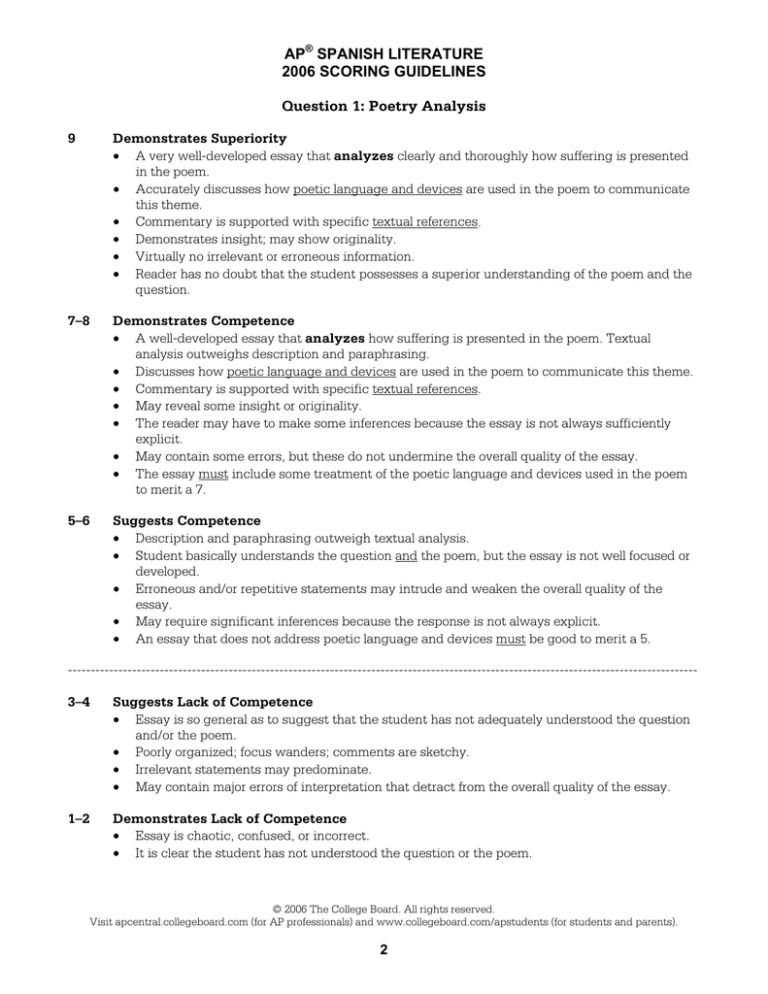
AP® SPANISH LITERATURE 2006 SCORING GUIDELINES Question 1: Poetry Analysis 9 Demonstrates Superiority • A very well-developed essay that analyzes clearly and thoroughly how suffering is presented in the poem. • Accurately discusses how poetic language and devices are used in the poem to communicate this theme. • Commentary is supported with specific textual references. • Demonstrates insight; may show originality. • Virtually no irrelevant or erroneous information. • Reader has no doubt that the student possesses a superior understanding of the poem and the question. 7–8 Demonstrates Competence • A well-developed essay that analyzes how suffering is presented in the poem. Textual analysis outweighs description and paraphrasing. • Discusses how poetic language and devices are used in the poem to communicate this theme. • Commentary is supported with specific textual references. • May reveal some insight or originality. • The reader may have to make some inferences because the essay is not always sufficiently explicit. • May contain some errors, but these do not undermine the overall quality of the essay. • The essay must include some treatment of the poetic language and devices used in the poem to merit a 7. 5–6 Suggests Competence • Description and paraphrasing outweigh textual analysis. • Student basically understands the question and the poem, but the essay is not well focused or developed. • Erroneous and/or repetitive statements may intrude and weaken the overall quality of the essay. • May require significant inferences because the response is not always explicit. • An essay that does not address poetic language and devices must be good to merit a 5. ----------------------------------------------------------------------------------------------------------------------------------------3–4 Suggests Lack of Competence • Essay is so general as to suggest that the student has not adequately understood the question and/or the poem. • Poorly organized; focus wanders; comments are sketchy. • Irrelevant statements may predominate. • May contain major errors of interpretation that detract from the overall quality of the essay. 1–2 Demonstrates Lack of Competence • Essay is chaotic, confused, or incorrect. • It is clear the student has not understood the question or the poem. © 2006 The College Board. All rights reserved. Visit apcentral.collegeboard.com (for AP professionals) and www.collegeboard.com/apstudents (for students and parents). 2 AP® SPANISH LITERATURE 2006 SCORING GUIDELINES Question 1: Poetry Analysis (continued) 0 No Credit • Blank page; OR response is on task but is so brief or so poorly written as to be meaningless; OR response is written in English; OR response is completely off task (obscenity, nonsense poetry, drawings, letter to the reader, etc.). © 2006 The College Board. All rights reserved. Visit apcentral.collegeboard.com (for AP professionals) and www.collegeboard.com/apstudents (for students and parents). 3 AP® SPANISH LITERATURE 2006 SCORING GUIDELINES Language Usage The AP Spanish Literature Exam tests the ability of students to write well-organized essays in correct and idiomatic Spanish. These scoring guidelines assess the degree to which language usage effectively supports an on-task response to the question. All the criteria listed below should be taken into account in categorizing the student’s command of the written language as related to each literature question. 5 Very Good Command • Infrequent, random errors in grammatical structures. • Varied and accurate use of vocabulary. • Control of the conventions of the written language (spelling, accents, punctuation, paragraphing, etc.). 4 Good Command • Some errors in grammatical structures; however, these do not detract from the overall readability of the essay/response. • Appropriate use of vocabulary. • Conventions of the written language are generally correct (spelling, accents, punctuation, paragraphing, etc.). 3 Adequate Command • Frequent grammatical errors, but essay/response is comprehensible. • Limited vocabulary. • May have numerous errors in spelling and other conventions of the written language. 2 Weak Command • Serious grammatical errors that force a sympathetic reader to supply inferences. • Very limited and/or repetitive vocabulary. • Pervasive errors in the conventions of the written language. 1 Inadequate Command • Constant grammatical errors that render comprehension difficult. • Insufficient vocabulary and control of the conventions of the written language. 0 No Credit • Unintelligible, written in English, or off task. Note: Both responses to question 3 receive one single language score. © 2006 The College Board. All rights reserved. Visit apcentral.collegeboard.com (for AP professionals) and www.collegeboard.com/apstudents (for students and parents). 8 © 2006 The College Board. All rights reserved. Visit apcentral.collegeboard.com (for AP professionals) and www.collegeboard.com/apstudents (for students and parents). © 2006 The College Board. All rights reserved. Visit apcentral.collegeboard.com (for AP professionals) and www.collegeboard.com/apstudents (for students and parents). © 2006 The College Board. All rights reserved. Visit apcentral.collegeboard.com (for AP professionals) and www.collegeboard.com/apstudents (for students and parents). © 2006 The College Board. All rights reserved. Visit apcentral.collegeboard.com (for AP professionals) and www.collegeboard.com/apstudents (for students and parents). © 2006 The College Board. All rights reserved. Visit apcentral.collegeboard.com (for AP professionals) and www.collegeboard.com/apstudents (for students and parents). © 2006 The College Board. All rights reserved. Visit apcentral.collegeboard.com (for AP professionals) and www.collegeboard.com/apstudents (for students and parents). © 2006 The College Board. All rights reserved. Visit apcentral.collegeboard.com (for AP professionals) and www.collegeboard.com/apstudents (for students and parents). © 2006 The College Board. All rights reserved. Visit apcentral.collegeboard.com (for AP professionals) and www.collegeboard.com/apstudents (for students and parents). © 2006 The College Board. All rights reserved. Visit apcentral.collegeboard.com (for AP professionals) and www.collegeboard.com/apstudents (for students and parents). AP® SPANISH LITERATURE 2006 SCORING COMMENTARY Question 1: Poetry Analysis Note: Student responses are quoted verbatim and may contain grammatical errors. Overview This question assesses students’ ability to write an essay analyzing the way in which a given theme is treated in a poem that is not on the required reading list for the course. On this year’s exam, the selection was “La araña,” a five-stanza poem by César Vallejo. Students were asked to analyze the theme of suffering in the poem and to discuss the poet’s use of language and poetic devices to communicate this theme. Sample: 1A Content Score: 8 Language Score: 5 Content: This well-developed essay demonstrates competence and earned a score of 8. Textual analysis outweighs description, and the student integrates some insightful observations about the spider’s suffering and how it engages others. The first paragraph introduces the idea of shared suffering: “Apesar [sic] de que es un animal el que esta [sic] sufriendo, la voz poética siente pena de tal animal y puede sentir su padecimiento.” The essay provides a perceptive discussion of how the theme of suffering is communicated through poetic language and devices. It includes discussion of anáfora (“En la primera, tercera y quinta estrofa, el primer verso empieza ‘Es una araña. . . .’ para enfatisar [sic] que es la araña la que padece y sufre y es quién [sic] causa ese dolor al poeta”) and personificación (“Sin embargo reemplazando ‘pies’ por patas se transmite un sentimiento más humano, donde el lector siente el padeciemiento [sic]”). The poet’s reaction to suffering, explained as “cierta relación sentimental” with the spider, is restated in the conclusion: “Se presenta el tema del sufrimiento que padece la araña, pero también se establece el sufrimiento de la voz poética al ver lo que esta [sic] pasando la araña, que son momentos de dolor, agonía, incertidumbre, angustía [sic] y resignación.” However, the reader needs to make some inferences because the answer is not always sufficiently explicit. For example, “encabalgamiento” and “hipérbaton” are mentioned, but their function in the poem is not well developed. Had the essay explained these observations more clearly and thoroughly, it would have earned a higher score. Language: This essay demonstrates very good command of the language to support an on-task response to the question. Grammatical structures are used correctly. There is varied and accurate use of vocabulary. However, there are random errors in the control of the conventions of the written language (“esta,” “quién,” “presopopeya,” “Apesar,” “enfatisar,” “forza”). Sample: 1B Content Score: 6 Language Score: 3 Content: This essay suggests competence and earned a score of 6. The essay directly addresses the theme of suffering, highlighting the use of the first person to anticipate the author’s engagement with the theme: “El sufrimiento es alguna cosa muy personal y la primera persona crea este sufrimiento personal.” The discussion of poetic language and devices refers to “estribillo” and “repetición” of certain verses, along with the physical description of the spider, as the means by which Vallejo communicates the theme of the poem. The student writes: “También, el autor usa estribillo cuando repite el verso ‘me ha dado qué pena esa viajera,’” “La araña le da al autor pena,” and “El lector sabe que el autor está sufriendo porque él © 2006 The College Board. All rights reserved. Visit apcentral.collegeboard.com (for AP professionals) and www.collegeboard.com/apstudents (for students and parents). AP® SPANISH LITERATURE 2006 SCORING COMMENTARY Question 1: Poetry Analysis (continued) repite el mismo verso y él usa una exclaimación [sic].” Textual analysis (for instance, the observations regarding “La araña incolora” and “los ‘ojos invisibles’”) is outweighed by description. Repetitive statements weaken the quality of the essay. Although the student basically understands both the question and the poem, the essay is not well developed overall. If the essay had been better focused and if it had provided more textual analysis, it would have earned a higher score. Language: The essay demonstrates adequate command of the language to support an on-task response to the question. Although there are grammatical errors (e.g., “Colores brillantes son muy contentos y no colores son muy deprimidos”), the essay is comprehensible. Vocabulary, however, is limited (“el autor lo repite el tiempo segundo,” “pies numeros”). Conventions of the language are generally correct. Sample: 1C Content Score: 2 Language Score: 1 Content: This essay demonstrates lack of competence and therefore earned a score of 2. It is confusing chaotic, and incorrect. The student is unable to articulate explicitly the theme of the poem: “descrubimos [sic] el tema de poema y es qué pena esa viajera.” A few poetic devices (anáfora, aliteración) are mentioned, but the essay never establishes how they are used in the poem to communicate the theme of suffering. There are major errors of interpretation, for example: “el vida es muy bajo y es muy importante para vivir a mucho” and “gran comparacion de las partes de una persona que the sistema de la vida.” The reader is left with the certainty that the student has not understood either the question or the poem. If the essay had been better organized and if it had analyzed the use of poetic language and devices as a vehicle to communicate the suffering of the spider or the sympathy expressed by the poet, it would have received a higher score. Language: This essay demonstrates inadequate command of language usage. Constant grammatical errors make reader comprehension difficult (“El poeta explique que una araña quien impide el abdomen seguir a cabeza,” “El poema es divida,” “un idea de los partes”). Vocabulary is insufficient and marked by interference with English (“cinco stanzas,” “the sistema,” “el poetica”). Spelling errors (“situacions,” “empeza”) and a lack of control of accents further undermine the quality of the essay. © 2006 The College Board. All rights reserved. Visit apcentral.collegeboard.com (for AP professionals) and www.collegeboard.com/apstudents (for students and parents).
